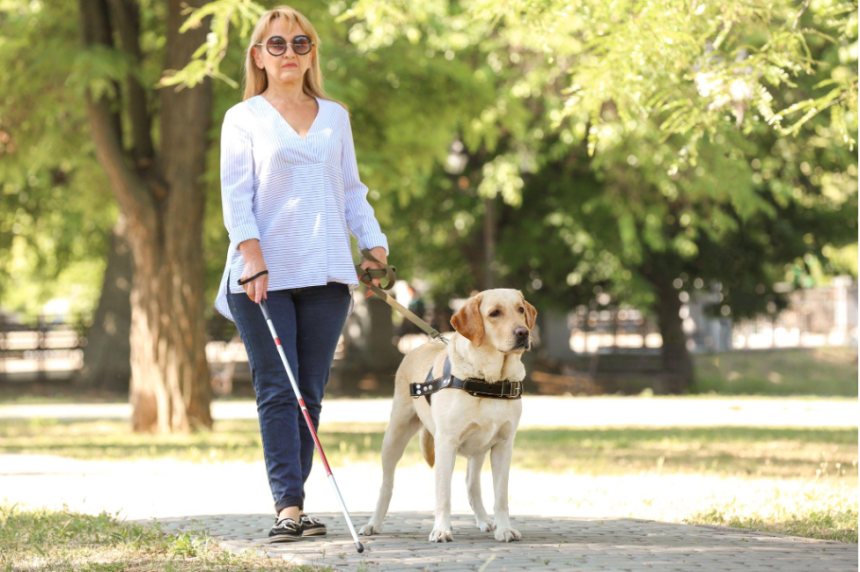We all know cats are the internet’s spirit animal, but when it comes to lending a paw (or should we say four paws?), there’s no competition. Service dogs are the ultimate companions, offering not just cuddles and endless entertainment, but life-changing support for people with disabilities.
So, if you’re ready to be amazed by the incredible bond between humans and their canine companions, keep reading to discover the fascinating world of service dogs.
What Makes a Dog a “Service Dog”?
If you’ve ever seen someone with a well-behaved dog in a place where pets aren’t usually allowed, there’s a good chance it’s a service dog. They’re not just there for moral support (although their adorable presence is a definite perk) but to provide vital assistance that empowers their handlers to live more independent lives.
While all dogs are unique in their own ways, only an elite squad of super pups gets to call themselves service dogs. That’s because they undergo intensive training from puppyhood to learn a multitude of specialized skills and tasks to assist people with disabilities.
In addition to being well-versed in different tasks, service dogs also undergo rigorous behavior training and socialization. This helps them maintain a calm and collected composure even in distracting public settings.
Can Any Dog Be a Service Dog?
There are no restrictions on breed or size for service dogs. So, don’t be surprised if you see a Labrador retriever guiding someone visually impaired or a miniature poodle fetching medication for someone with limited mobility.
If your furry friend has completed the necessary training and has a legitimate service dog certification, they are all set to join the elite league of canines.
Different Types of Service Dogs
Now that you know what it takes to become a service dog, let’s explore the specialized roles these canine helpers play. While they may all look equally adorable, each service dog has its own unique “pawfessional” skills.
Seeing Guide Dogs
These fantastic service dogs are highly trained to guide individuals with visual impairments, helping them navigate obstacles and new environments quickly and safely.
Hearing Assistance Dogs
These service dogs can be lifesavers for people who are deaf or hard of hearing. They’re trained to alert their handlers to important sounds, such as doorbells, alarms, or emergency vehicles.
Service Dogs for Mobility Issues
Imagine a dog strong enough to help someone with balance issues or limited mobility. These service dogs are trained to assist with opening doors, picking up dropped items, or pulling wheelchairs.
Seizure Alert and Response Dogs
These highly trained pups use their super-sniffer skills to detect subtle changes in human physiology and alert their handlers to upcoming seizures or other medical emergencies. Their quick response can potentially save lives.
Psychiatric Service Dogs
These service dogs provide emotional support and assistance for people with mental health conditions like anxiety, depression, or PTSD. They are trained to perform various tasks, such as interrupting panic attacks, providing deep pressure therapy, or reminding their handler to take medication.
Autism Assistance Dogs
These service dogs are specially trained to assist children and adults with autism. They can provide comfort and security, help with social interaction, or even intervene during meltdowns.
Allergy Detection Dogs
These incredible dogs can be trained to detect the presence of allergens, such as peanuts, gluten, or certain chemicals. This can be life-saving for people with severe allergies, allowing them to avoid potential dangers.
Fetal Alcohol Spectrum Disorder (FASD) Assistance Dogs
These service dogs can be trained to assist people with Fetal Alcohol Spectrum Disorder (FASD). They provide support with balance, emotional regulation, and interrupting self-injurious behaviors.
Cardiac Alert Dogs
These dogs are trained to detect heart rhythm or blood pressure changes, alerting their handler to potential cardiac events.
Medical Alert Dogs
These incredible dogs are trained to detect changes in a person’s body chemistry, alerting their handler to potential medical issues. For instance, they can detect fluctuations in blood sugar levels for people with diabetes or sense changes in heart rate or blood pressure for people with certain medical conditions.
Service Dogs Are More Than Pets
Before we wrap up, we would like to clarify that this isn’t an exhaustive list, as new types of service dogs are constantly being trained to meet the specific needs of people with disabilities.
The most important thing to remember is that service dogs are not pets. They are highly trained working animals that provide invaluable assistance to their handlers.
So, the next time you see a service dog, give them the respect and space they deserve.
Lynn Martelli is an editor at Readability. She received her MFA in Creative Writing from Antioch University and has worked as an editor for over 10 years. Lynn has edited a wide variety of books, including fiction, non-fiction, memoirs, and more. In her free time, Lynn enjoys reading, writing, and spending time with her family and friends.















